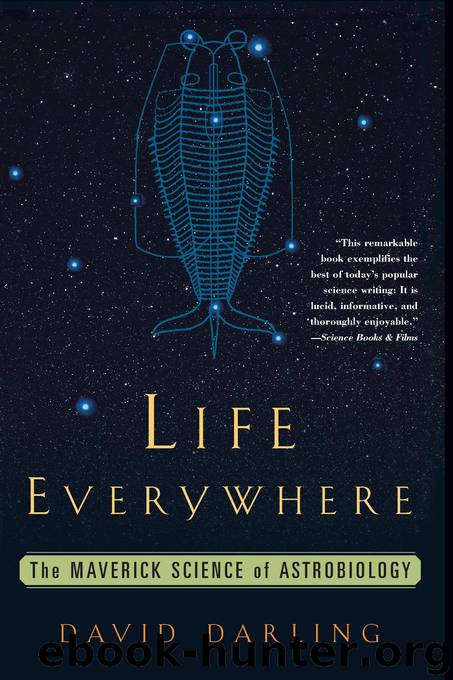Life Everywhere: The Maverick Science of Astrobiology by David Darling

Author:David Darling
Language: eng
Format: mobi, epub
Publisher: Basic Books
Published: 2007-10-15T03:00:00+00:00
But Ward and Brownlee go further: they actually pick and choose the factors that best suit their case. Without the Moon, they claim, the emergence of complex organisms would have been frustrated by large climate swings. Yet they go on to endorse the idea that what may have been the biggest climate variations in our planet’s history—from Snowball Earth to subsequent warming—were key catalysts for the rise of multicellular life. They even point to a possible further trigger for complex life in the form of a so-called inertial interchange event (IIE) which, in 1997, Kirschvink and his colleagues David Evans and Robert Ripperdan suggested may have taken place over a 10- to 15-million-year-period at the time of the Cambrian Explosion. According to the IIE theory, the Earth’s spin axis underwent a 90-degree change in direction relative to the continents. This change, speculate Ward and Brownlee, “would have fragmented ecosystems and could have prompted evolutionary diversification.” Four chapters later, however, Ward and Brownlee do a spin flip of their own, arguing that “If the polar tilt axis had [in the absence of the Moon’s stabilizing influence] undergone wide deviations from its present value, Earth’s climate would have been much less hospitable for the evolution of higher life forms.” Which is it to be? We’re not in any position to say what sort of climate disturbances tend to hold evolution in check and which, in the long run, spur it on. Yet, time and again, this is the game that Rare Earth tries to play.
At this point we can begin to glimpse the frailty of the Rare Earth position. Its problems stem from an unsubstantiated initial assumption—namely, that complex life (as distinct from primitive microbial life) is difficult. How do we know that? Complex life is difficult, say Rare Earth supporters, because it took so long—almost four billion years—to evolve on Earth. If it’s difficult, then in order to have nurtured it Earth must be special. And then the laundry list starts: Our world’s a special size with a special kind of moon. It goes around a certain kind of star, at a very specific distance, in a very particular kind of solar system, and has a unique history. Its climate, record of impacts—everything was just right on this precious bit of real estate for complex life to emerge. What are the odds of finding all these factors together elsewhere? Very low. Therefore, complex life is rare.
But hold on. Just because it took complex life four billion years to evolve here, doesn’t mean it has to take that long. We haven’t a clue whether or not the Earth was ideal for raising complex life. We do have pretty good evidence that global upheavals of various kinds are generally good for encouraging life to get rid of the dead wood, experiment, adapt and explore new survival strategies. We do have evidence to suggest there were long periods of Earth’s history where very little biological progress was made. Maybe, worlds to which stressful things
Download
Life Everywhere: The Maverick Science of Astrobiology by David Darling.epub
This site does not store any files on its server. We only index and link to content provided by other sites. Please contact the content providers to delete copyright contents if any and email us, we'll remove relevant links or contents immediately.
Tools of Titans by Timothy Ferriss(8365)
Turbulence by E. J. Noyes(8040)
Secrets of Antigravity Propulsion: Tesla, UFOs, and Classified Aerospace Technology by Ph.D. Paul A. Laviolette(5365)
Astrophysics for People in a Hurry by Neil DeGrasse Tyson(5182)
Room 212 by Kate Stewart(5105)
Design of Trajectory Optimization Approach for Space Maneuver Vehicle Skip Entry Problems by Runqi Chai & Al Savvaris & Antonios Tsourdos & Senchun Chai(5063)
Pale Blue Dot by Carl Sagan(4996)
The David Icke Guide to the Global Conspiracy (and how to end it) by David Icke(4704)
A Journey Through Divination and Astronomy by Publishing Pottermore(4379)
Goodbye Paradise(3798)
Apollo 8 by Jeffrey Kluger(3702)
COSMOS by Carl Sagan(3617)
The Five People You Meet in Heaven by Mitch Albom(3561)
Losing the Nobel Prize by Brian Keating(3534)
How to Read Water: Clues and Patterns from Puddles to the Sea (Natural Navigation) by Tristan Gooley(3460)
Brief Answers to the Big Questions by Stephen Hawking(3429)
How to Read Nature by Tristan Gooley(3335)
The Order of Time by Carlo Rovelli(3188)
A Brief History of Time by Stephen Hawking(3022)
